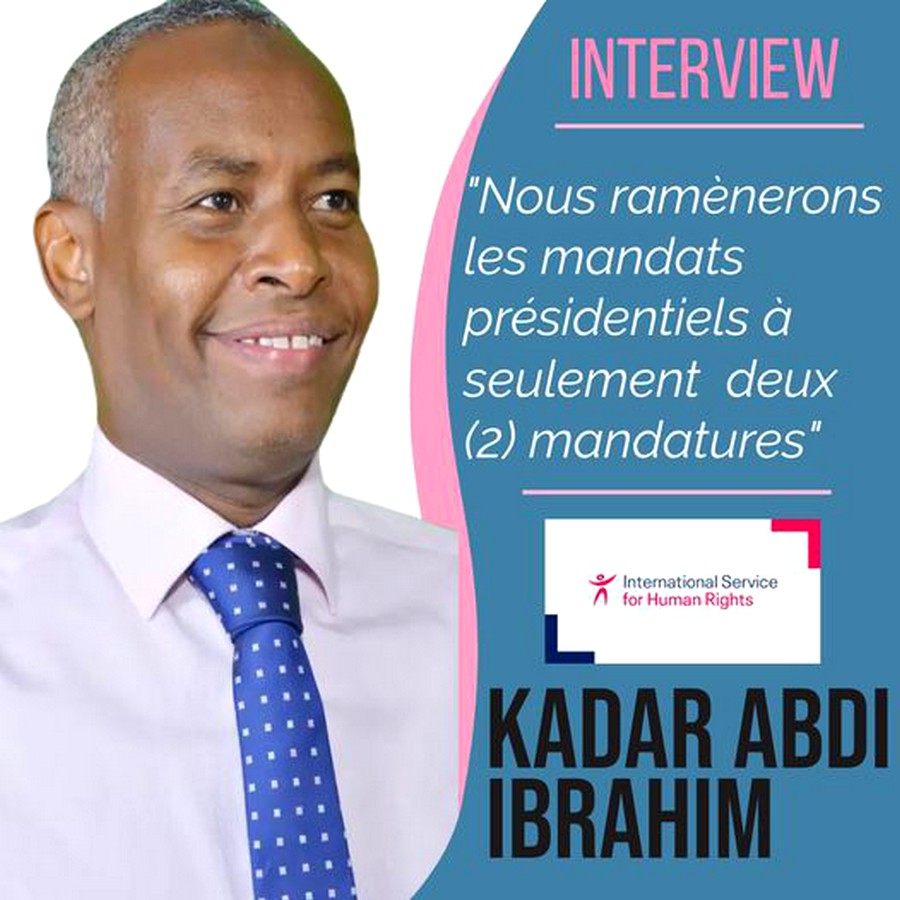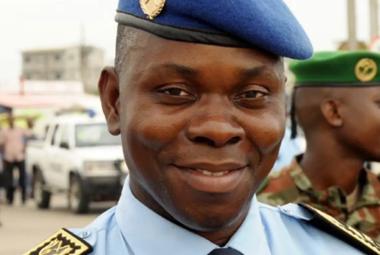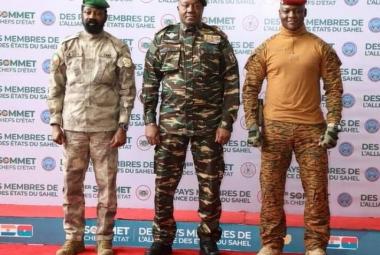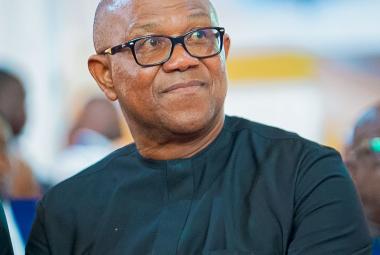The President of the Movement for Development and Freedom (MoDeL), Kadar Abdi Ibrahim, gave an interview to the International Service for Human Rights (ISHR) about the socio-political situation in Djibouti. The political opponent and Human rights defender returned to the themes that are very dear to him for his country, Djibouti. His Interview conducted by Francisco Pérez.
Francisco Pérez: Please introduce yourself in a few words.
Kadar Abdi Ibrahim: My name is Kadar Abdi Ibrahim, I was a professor of mathematics at the University of Djibouti, I say "I was" because I was fired from my teaching post and removed from the civil service by presidential decree in February 2016 after 18 years of activities in the faculty, I am currently president of MoDeL since December 31, 2021, until 2025. I am also a freelance journalist and I was awarded in September 2021 by the London-based Index Censorship for freedom of expression.
Francisco Pérez: What inspired or pushed you to get involved in the defense of human rights?
Kadar Abdi Ibrahim: To understand my commitment, you have to understand my country. For nearly half a century, Djibouti has become a country where the law of the strongest reigns and the absence of any rules other than those of the regime.
What inspired and pushed me to get involved in the defense of human rights is above all my deep conviction in the inherent dignity of every human being. I witnessed the injustices, abuses and suffering inflicted on my compatriots and felt a moral duty to take a stand and contribute to positive change.
Inspiration also comes from the history of the struggle for human rights around the world. Iconic figures such as Nelson Mandela, Martin Luther King Jr., Indira Gandhi and many more have shown that one person can have a significant impact by advocating for justice and the rights of all. Their determination and courage motivated me to actively engage in this fight. It's true, I say it, it was a catalyst in my commitment.
Finally, I am driven by the hope of contributing to a better future for generations to come. Currently, the dreams of an entire generation are suffocated under the weight of censorship and fear. So, by working for positive change today, I want to create a legacy of respect for human rights, democracy and justice for future generations. My motivation therefore stems from my faith in the possibility of advancing our society towards greater equality, freedom and dignity for all.
Francisco Pérez: What would Djibouti and the daily lives of the communities you serve look like if you were able to achieve your vision and goals?
Kadar Abdi Ibrahim: If our vision of ending the dictatorship in the Republic of Djibouti and successfully defending human rights were to become a reality, my compatriots whom we serve and the country itself could undergo truly profound and positive transformations.
First, the country could enjoy a thriving democracy where every citizen's voice counts. First, we will reduce presidential terms to only 2 terms and this will be a crucial measure to promote democracy, political alternation, and long-term stability. In this sense, free and fair elections would be the norm, allowing people to choose their leaders and influence the future of the country in meaningful ways.
We will promote freedom of expression, which currently does not exist, since there is only one television channel, only one newspaper, both of which are propaganda media and which only deal with factual events, and therefore we will promote the creation of independent media and especially the active participation of citizens in public debates without fear of reprisals and I am personally convinced of this, this will create an environment where new ideas and creative solutions could emerge to solve the problems of society.
National institutions that have been trampled on and degraded will be strengthened by judicial reforms guaranteeing the rule of law, justice for all and eliminating the abuses of power and arbitrary detentions that are so common today.
Finally, we will reduce the cost of living, in particular by lowering electricity prices in Djibouti, which is excessively very expensive when we live in one of the hottest countries in the world.
To sum up, the Djibouti we want to see requires a long-term process that requires a comprehensive and coherent approach as well as the active participation and collaboration of various actors in society.
Francisco Pérez: Is there a professional success or an episode of your experience as an activist that makes you particularly proud?
Kadar Abdi Ibrahim: For me, pride only comes when we manage to achieve our goals and our vision for our country. Each small step towards a more just and democratic Djibouti, where human rights are respected, represents a victory that strengthens my determination to continue the fight. Each time we succeed in raising awareness of our causes and in mobilizing the support of the international community, I feel a deep satisfaction and a sense of shared pride with all those who work for a better future.
Francisco Pérez: Have you suffered any threats, attacks or reprisals because of your work?
Kadar Abdi Ibrahim: Yes, of course, but I am not the only one to suffer threats, attacks, reprisals or constant surveillance. This shows how our commitment is seen as a threat by those who seek to maintain oppression and restrict the voice of truth. I was arrested several times, my passport was confiscated by the regime the day after my return from Geneva, after having participated in the Universal Periodic Review (UPR) in April 2018, more than 5 years now, the newspaper l 'Aurore, of which I was co-director of publication, was banned from publication, and I was fired from my teaching position at the University of Djibouti and removed from the civil service in February 2016. I am banned from work in my own country.
Francisco Pérez: Do you have a message for the international community and the UN?
Kadar Abdi Ibrahim: The situation in our country requires urgent attention. I take this opportunity to call on the international community and the United Nations to look at themselves in the mirror. Ladies and gentlemen, with all due respect, you are the first to take offense in the media and to declare, hand on heart and voice vibrating with conviction, that you want to defend human rights and democracy. The truth is that no one believes in this speech framed by an exhilarating rhetoric as the reality in which we live daily is at the antipodes of this speech.
There is a significant dissonance between the sensitivity of the average citizen who suffers the most abject pangs of African dictatorships and your inaction. A real disenchantment, I would go so far as to say, a contempt has settled in the hearts of populations and civil society vis-à-vis international and UN institutions.
Realpolitik and geopolitical considerations have deeply buried democracy and the defense of human rights. The only instruments to unearth democracy and human rights is to return to old values, those values which are true and on which our success depends, that is to say: honesty, ethics, courage, respect for rules and people, loyalty.
Francisco Pérez: Do you have a message for your fellow human rights defenders in Djibouti, in Africa for that matter?
Kadar Abdi Ibrahim: My words cannot express all the admiration and respect I feel for each of them. Your dedication to upholding the dignity of every individual, fighting oppression and promoting positive change is a flame that shines in the midst of darkness, bringing hope and the promise of a better future. You are like the candle which burns itself slowly but which lights up the others. You embody the unshakeable spirit of resistance and justice.
In the midst of adversity, remember that every action you take, every voice you raise, every life you touch, makes a difference. Every step toward justice you take today paves the way for future generations. Every battle we fight, every victory we celebrate, brings us closer to the future we are building for our peoples and for the world.
Your legacy will be etched in the pages of history, a testament to your dedication and sacrifice.
I wish you an unwavering commitment.
Francisco Pérez: Do you have a message for the government and the people of Djibouti?
Kadar Abdi Ibrahim: I will first begin my message for the people of Djibouti, because my message is imbued with concerns, but also with the conviction that positive changes are possible if we work together:
My beloved fellow countrymen,
Our grandparents and our parents carried the torch of independence with courage and determination. Today, it is our duty to keep this flame burning, to transform it into a bonfire of dignity and justice for our generation and those to come. The dreams they weaved into the fabric of history are our legacy, and it's time to make those dreams come true.
Each generation is called upon to take up a unique challenge, and ours is to build a Djibouti where human dignity is inalienable, where each individual can breathe the air of freedom and flourish in a climate of justice and equality. We inherit a sacred mission: to build the foundations of a nation where our children and grandchildren will thrive, a country that will radiate hope and possibility.
True freedom will not be given to us by the coming to power of this or that other man, but flows from the universal power that we all possess, one day or another, to resist the abuses of authority. The dawn of individual freedom dawns when we have instilled in everyone a belief in their ability to direct the exercise of power and command respect.
You are the guardians of your future, the defenders of your rights and the architects of the nation. Your voice matters, and your commitment can catalyze the change you desire. Engage yourself !
To the Djiboutian government, Dear officials, Under your reign, Djibouti monopolizes the last positions in all indicators, whether on the economic level, human rights, freedom of expression or the fight against corruption. The population is under constant pressure and lives in difficult conditions. The country is really parched with corruption. This is the result of your reign.
Now, have the decency to consider the legitimate aspirations of your fellow citizens who desire a Djibouti where citizen participation is encouraged, where transparency reigns and where fundamental rights are protected. Unleash the voices of civil society.
Interview by Francisco Pérez.
ISHR (International Service for Human Rights).
*This article has been translated from French into English by Marcus Boni Teiga




















